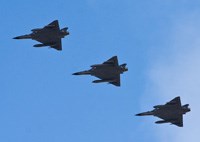
Top stories






More news


Marketing & Media
Ads are coming to AI. Does that really have to be such a bad thing?














"Companies are happy. There is a determination to grow and invest. Five years ago, it was the opposite," said Carlos Pieratoni Gamboa, vice-president of the Brazilian Association of Defence and Security Equipment (Abimde).
Abimde, which groups 170 companies, hopes to invest US$120bn over the long term, planning to double the current 25 000 direct jobs it generates and boost annual export sales from US$1.7bn to US$4bn.
Brazil, the world's sixth largest economy, was ranked as the world's eighth largest arms exporter in the 1980s but today languishes in 30th place, according to industry experts.
Brazil still boasts the biggest armed forces in the region, although they have been considerably weakened by a lack of investment in equipment for more than two decades.
President Dilma Rousseff, like her predecessor Luiz Inacio Lula da Silva, has gone head-to-head with the armed forces over the establishment of a truth commission to probe rights abuses during the 1964-1985 military dictatorship.
However, the two also helped fuel the current boom by investing in equipment and underscoring the strategic importance of a domestic defence industry in line with a national defence strategy unveiled in 2008.

This year, Rousseff approved incentives to boost production and domestic purchases, and Brazil has bought conventional submarines and helicopters from France, insisting on technology transfer and assembly on its territory.
It also resurrected a plan to develop, beginning in 2016, its first nuclear-powered fast attack submarine.
In addition, a government decision is awaited on awarding a multibillion dollar contract for 36 fighter jets. The Rafale, made by French firm Dassault, is competing against US aviation giant Boeing's F/A-18 Super Hornet and Swedish manufacturer Saab's Gripen jet for the contract.
"We need this industry because it is strategic for our sovereignty, because of the size of our territory, the length of our borders and because we have been blessed with enormous (natural) wealth," Rousseff has said.
The Brazilian defence market is attracting foreign interest despite the world economic slowdown.
"There is a clear movement of foreign firms seeking partnerships with Brazilian counterparts," a strategy which offers technology transfer to Brazil while foreigners gain access to government contracts that give priority to the domestic industry, Oswaldo Luiz Guimaraes, engineering manager at the Brazilian firm Jaragua, told AFP.

Jaragua, which has been boosting its defence activities, launched a joint venture with the Italian firm Oto Melara to produce cannons in Brazil and set up a maintenance centre for Latin America.
Brazil sees its neighbours and other emerging countries as natural markets for its products and has stepped up military and industrial cooperation with them.
Joint projects include the new KC-390 military transport plane being developed by Brazil's top plane maker Embraer, with partners from Argentina, Chile and Colombia - which also plan to buy the aircraft.
This strategy provides Brazil with customers while allaying fears of a Brazilian military build-up, according to Nelson During, chief editor of the country's respected defence website DefesaNet.
Brazil's Flight Technologies company, which last weekend took part in the first defence industry show in Brasilia, is reaping the benefits of this policy.
It develops drones to protect the borders and has already sparked interest in neighbouring countries, said its marketing manager Noli Kozenieski.
Last year, Brazil's defence budget reached US$36.6bn, the world's 10th largest, according to the International Institute for Strategic Studies.
However, more than 80% of this budget is traditionally earmarked for salaries and many investments - such as the contract for the 36 fighter jets - have been postponed.
The government says roughly 1.5% of the country's GDP goes to defence, much less than in several neighbouring countries and major emerging powers.
"The situation is promising for the Brazilian industry but challenges lie ahead," During said, stressing that the government must guarantee its planned investments in spite of the economic crisis.
Source: AFP via I-Net Bridge

For more than two decades, I-Net Bridge has been one of South Africa’s preferred electronic providers of innovative solutions, data of the highest calibre, reliable platforms and excellent supporting systems. Our products include workstations, web applications and data feeds packaged with in-depth news and powerful analytical tools empowering clients to make meaningful decisions.
We pride ourselves on our wide variety of in-house skills, encompassing multiple platforms and applications. These skills enable us to not only function as a first class facility, but also design, implement and support all our client needs at a level that confirms I-Net Bridge a leader in its field.
Go to: http://www.inet.co.za